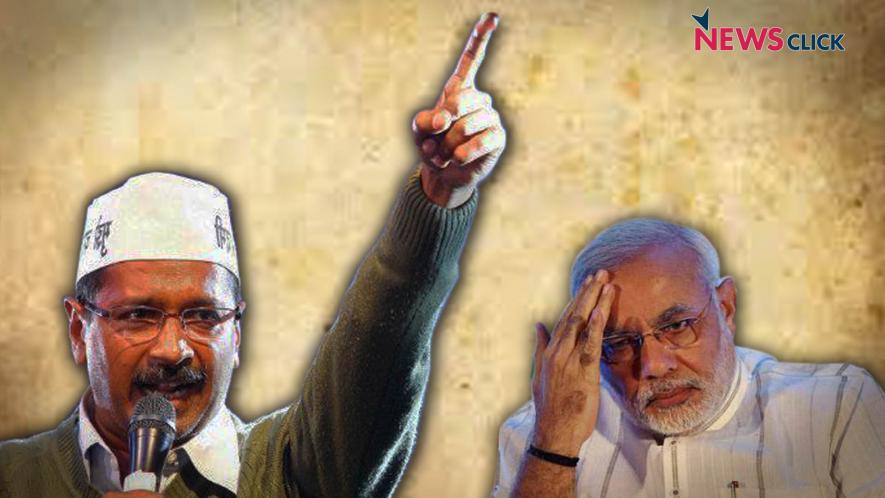BJP’s Bitter Fight for Survival in Delhi

Newsclick Image by Sumit
On 4 July, the Supreme Court clarified a Constitutional enigma that had haunted Delhi since the 1950s. Operatively, what the Court said was that in all matters except land, police and public order, the state govt.’s decisions would prevail. The Lt. Governor, as the representative of the central govt., should not behave in an ‘obstructionist’ manner and should go by the advice of the council of ministers, it said.
Also Read: Delhi Lieutenant Governor Bound by Government’s Advice, says Supreme Court
One would have thought that this rebuke by the apex court of the country would bring some balance to the single-minded strategy of disruption and obstruction that the Modi govt. had adopted after BJP’s decimation in the 2015 Assembly polls.
However, just six days have passed since the landmark judgement and it feels as if nothing has changed. On 9 July, Chief Minister Arvind Kejriwal wrote to LG Anil Baijal decrying the stance of the Ministry of Home Affairs on transfers and postings of officers. He reportedly said that in view of the Court’s judgement, Delhi govt. was entitled to undertake posting of officers and the MHA could not interpret the SC in its own way. On 10 July, AAP’s counsel raised the matter in the Court requesting speedy hearing to their pleas on specific issues after which the Court fixed the date for “next week”.
To be fair, the Supreme Court has referred all specific matters of dispute between the Centre and the Delhi govt. to a regular Bench, clarifying only the Constitutional framework. But the clarification itself will be subverted in practice if the Centre pays no heed to its spirit. The BJP govt. at the Centre seems to have no regard for this spirit, and neither does it want to settle it by allowing minimum democratic space to the AAP govt. in Delhi.
Also Watch: BJP's War on Federalism: Battleground Delhi
This underlines an aspect that is usually overlooked in mainstream analyses of the AAP-BJP tussle: the animus that BJP maintains towards AAP is not just a matter of defeat in 2015. In the past three years it has evolved into something far more dangerous. It is a hostility to AAP’s policies and mobilizational efforts. AAP’s success in cutting water and electricity charges, turning around the declining govt. school system in Delhi, its appointment of teachers and upgrading of school infrastructure, its efforts at ensuring availability of medicines in govt. dispensaries, its efforts at curbing pollution, and its continued interaction with Delhi’s people – all these have set an example of alternative policy approach to the BJP’s privatise, centralise and saffronise approach.
One look at the issues on which the LG had held up decisions, presumably representing the views of the Central govt., shows that not only is the central govt. playing havoc with the principles of federal structure, it is sacrificing its own (already depleted) goodwill or support among the people of Delhi. Here are some of the decisions that the AAP govt. took immediately after the SC judgement reversing earlier objections by the LG: doorstep delivery of rations, installation of CCTVs, construction of academic block at Delhi Technological University, construction of new hospital at Burari. These are the kind of issues which Modi govt. (through the LG) had put a spanner into.
Apart from these, there are nine appeals filed by the AAP govt. before the Supreme Court that are pending. These include validity of two ministry of home affairs (MHA) and two Delhi government notifications; commissions of enquiry into the alleged CNG fitness scam and allegations of malpractices in the Delhi and District Cricket Association (DDCA). One of the MHA notifications pertains to transfers and postings of officers and another to jurisdiction of the Anti-Corruption Bureau.
It is bizarre that the BJP govt., which came to power claiming to fight corruption, is opposing the Delhi govt. to move against high profile cases of alleged corruption. The only explanation can be that either it has some vested interest in preventing enquiries into the CNG scam and the DDCA’s functioning or that it has a general approach of not allowing AAP to gain popular support through such enquiries. Either way, the Modi govt. comes across as obstructionist and violative of federal distribution of powers. In fact, it now appears to be contemptuous of Supreme Court also.
Some of the other notifications of Delhi govt., that were quashed by the High Court which sided with the LG’s prerogative are: appointment of nominee directors on the board of the three private sector power companies in Delhi, the direction to the Delhi Electricity Regulatory Commission regarding disruption of electricity supply to consumers, the revenue department’s notification revising minimum rates for charging stamp duty on instruments related to the sale/transfer of agriculture land and the appointment of special public prosecutors for arguing sensitive cases.
Also Read: If Delhi is a Circus Then BJP and Congress Are Its Main Acrobats
Why is the Central govt. opposed to such straightforward governance steps? Again, does it have a vested interest in the protection of private power discoms or is it just obstruction to keep the AAP from acting in favour of the people?
The suspicion that the BJP’s local unit and the central leadership is acting only out of pique and hostility to alternative policies is confirmed by the fact that they have not taken up a hundred other burning issues on which the AAP govt. has failed. One example is that of minimum wages, which was notified by the AAP govt. in March 2017 at Rs.13,896 for unskilled workers but has been kept in abeyance because the industrialist lobby is opposed to it. There is widespread anger at this and 11 trade unions have called for a strike on 20 July to demand its implementation. The BJP and its trade union wing are not supporting it. There are various such issues where BJP could have seized the initiative but no, they only oppose what the AAP does.
The BJP’s opposition to AAP is a fight for its survival not only in Delhi but elsewhere too, because ruling regional parties (and even BJP allies) are disturbed by the hounding of the AAP govt. But it can’t surrender in this tussle because to do so would mean admitting that there are better ways of governance.
Get the latest reports & analysis with people's perspective on Protests, movements & deep analytical videos, discussions of the current affairs in your Telegram app. Subscribe to NewsClick's Telegram channel & get Real-Time updates on stories, as they get published on our website.
























